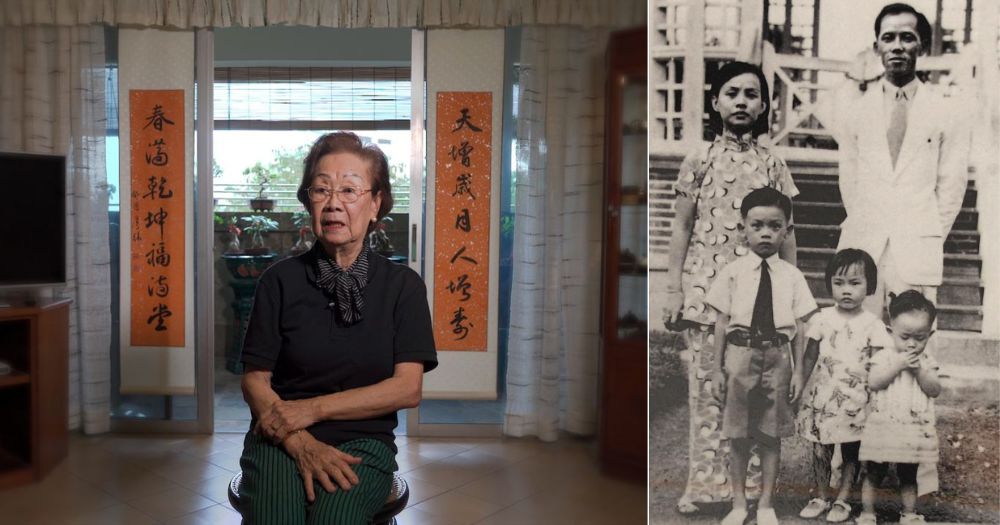OCBC Bank will always mean something special to 87-year-old Sim Soo Wee.
When the Japanese invaded Singapore in February 1942, some OCBC staff members and their families sought refuge in the basement of the bank, including Sim’s family.
At the time, Sim was only seven years old.
Sought shelter at OCBC Bank basement
The sprightly great-grandmother shared that her father, Sim Teow Kwong, had worked at OCBC Bank since the 1930s.
As a child, Sim did not know what her father’s role in the bank was, but was told by older relatives and family friends years later that he had dealt with foreign currencies.
Sim’s father was a well-learned man who taught himself English before getting a job at the bank, in a time where bilingualism was a rare and prized trait.
The older Sim was a loving husband who would help Sim’s mother perm or cut her hair, Sim recalled fondly.
He was also a doting father who would bring Sim and her two siblings – a brother and a sister – out during his free time.
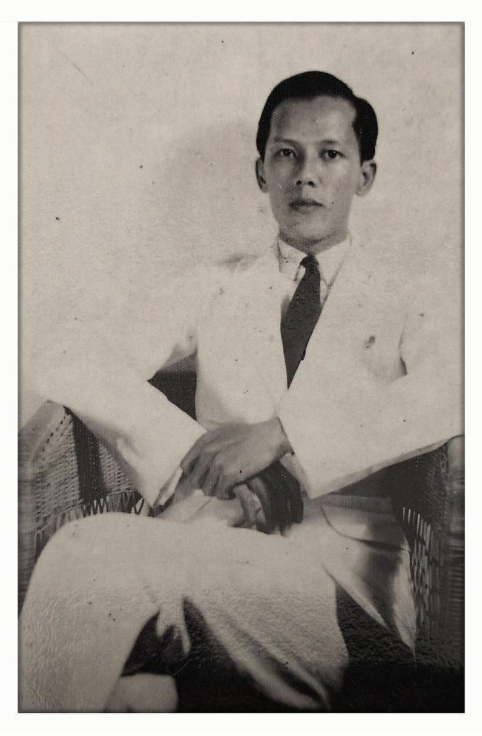
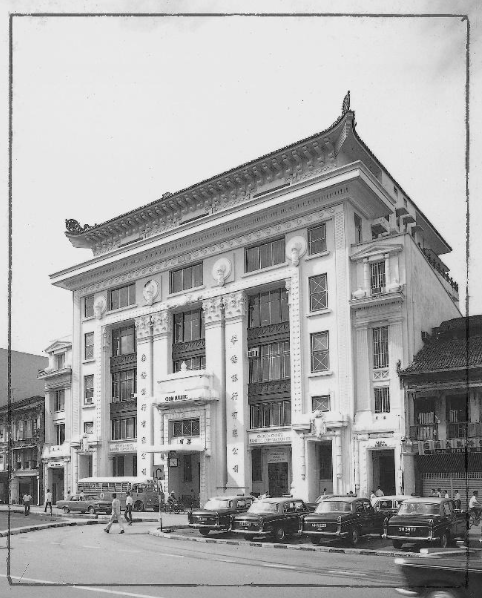
Back then, the bank was located at the old China Building on Chulia Street. When the war broke out, it ended up being a temporary refuge for the bank’s employees and their families.
“Those days, you didn’t know when you would die,” said Sim of the frequent bomb raids.
Despite facing a grave situation and uncertainties, Sim remembered people sharing food with one another in the basement.
Sim’s family brought canned food to the shelter to ride out the bombing.
They eventually emerged from the bank’s basement after there were no longer any scary sounds above.
“You’d never have guessed that a bank kept us safe like this,” she concluded in an earlier interview with OCBC’s in-house magazine, Teller, in Jan. 2021.
Lost her parents because of the war, separated from siblings
Sadly, Sim’s father and her uncle were taken by the Japanese soldiers just a few days into the Japanese Occupation.
Her father was only 37 years old then.
Sim shared that they were most likely deemed as intelligentsia because of their smooth hands, how they spoke and her father’s occupation as a forex trader.
“When they were asking him questions, I think he must have been too honest. He didn’t know they would take him away,” she said.
That was the last she saw of her beloved father.
Sim’s mother was heartbroken by her husband’s death and passed away from tuberculosis soon after.
It was not easy for Sim to accept her father’s death either.
It took three-and-a-half years after the end of Japanese Occupation for her to accept the fact that she would never see her father again.
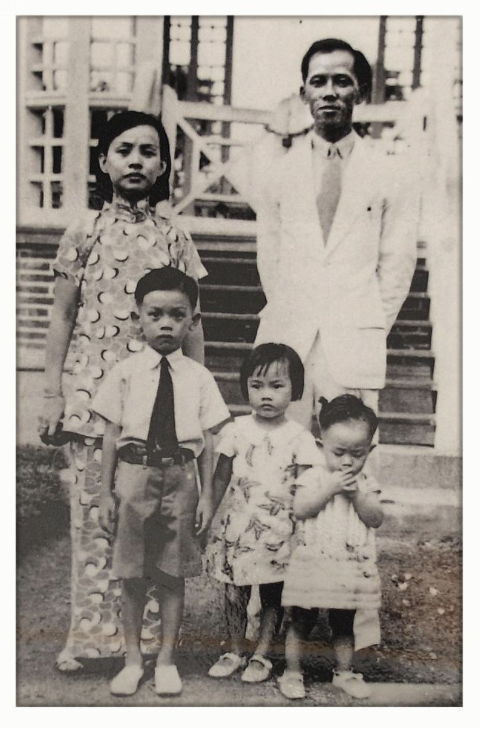
Besides losing both parents, the Sim siblings were separated too, as they were being cared for by different relatives.
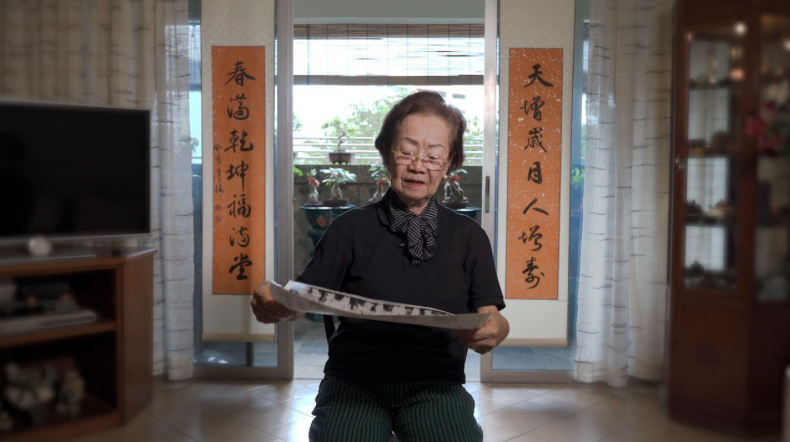 Sim looking at a group photo of OCBC staff members, including her father. This is the first time she’s seen this photo. Photo by Isaac Wong.
Sim looking at a group photo of OCBC staff members, including her father. This is the first time she’s seen this photo. Photo by Isaac Wong.
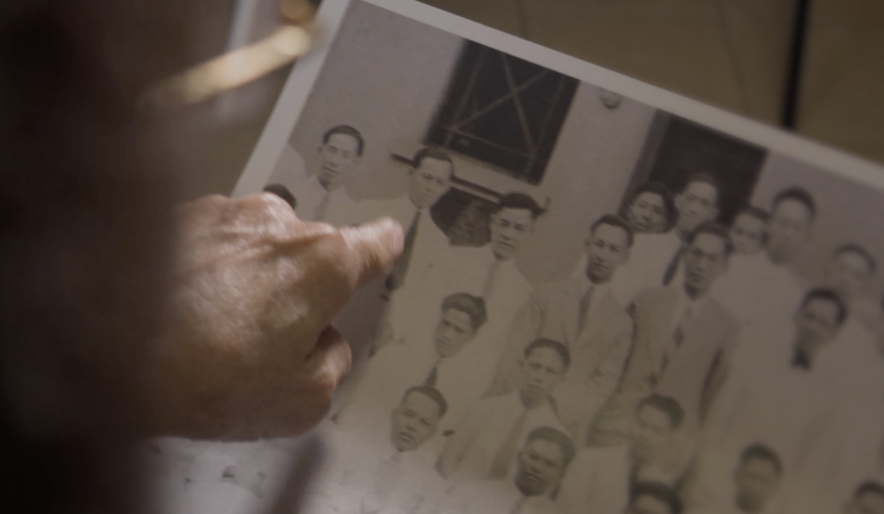 Sim identifying her father in the photo. Photo by Isaac Wong.
Sim identifying her father in the photo. Photo by Isaac Wong.
Life after her parents’ passing
Gratitude towards her aunt
Sim subsequently lived with her maternal uncle’s family.
Even though the family was poor, Sim’s uncle and aunt treated her like their own child which she is grateful for.
Sim shared that her aunt did not save the better food for her own daughter, who was four years younger than Sim.
Instead, she treated both equally and even once scolded Sim for being “silly” to not take the larger pieces of meat or vegetables that were on the table.
“She was a really good woman, I don’t think I’ve ever met anyone as generous and kind as her,” she said.
Financial help from OCBC Bank
Besides her uncle’s family, another pillar of support for Sim came from her father’s colleagues and the bank.
After some of his colleagues found out that Sim’s father had been taken away by the Japanese, they supported his wife and three children financially for a few months before Sim’s mother passed away and the children were split up.
Later on, the bank searched for the families of their employees to render financial support in the aftermath of the war.
Through a family friend, the bank eventually found Sim and her siblings and gave them S$1,000 – about S$6,300 in today’s money – in total.
They split the money along with her uncle’s family, and Sim received S$200.
Instead of keeping the money in a biscuit tin, she chose to deposit her share into a newly opened OCBC account.
“At that time, I didn’t know anything about investing. But putting my money in the bank was the safe choice, I knew I could at least gain interest from it,” she said, adding that one of her regrets in life is not keeping her deposit book as a memento.
Hustling at young age
After the war ended, Sim was concerned about survival. While she had some money to rely on in the form of the OCBC cash gift, she knew she also needed to find a way to keep her income coming.
Hardship was not an issue for Sim. To help bring food to the table, Sim would follow what other children on the streets were doing – sweeping up rice grains that were littered on the ground when the coolies carrying rice bags passed by.
The rice grains collected could either be eaten or sold for money, she said.
When she was just a teenager, Sim had already worked at factories and tried babysitting to support herself.
At 13, she learnt to sew belts and did embroidery work.
She eventually became a seamstress after learning how to make beautiful samfu and cheongsam from her aunt.
“I’ve already managed to pull through these painful life and death events, so any challenges that came after – I would just take them on,” Sim said resolutely.
Watch Sim share her story here:
Writing this article that is sponsored by OCBC Bank makes the writer want to rewatch her all-time favourite local drama Stepping Out.Top image by Isaac Wong and Sim Soo Wee
If you like what you read, follow us on Facebook, Instagram, Twitter and Telegram to get the latest updates.
